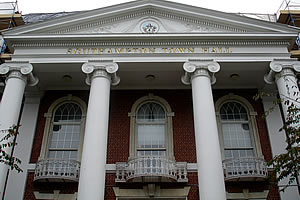
Aggregate means to form separate units into one group.
In its simplest terms, a community choice aggregation program for electricity means a municipality can gather together residents and small businesses and act as one customer purchasing electricity. Southampton Town is looking to do that.
On April 26, officials held an information meeting about Community Choice Aggregation (CCA), the second in a series of meetings on the topic.
The town believes CCA has the greatest potential to bring renewable energy into the community in a relatively short period of time without the disruptive infrastructure improvements that might otherwise need to take place, Deputy Supervisor Frank Zappone said, opening the gathering. CCA could also provide electric energy cost savings to Southampton Town residents.
As the town continues to investigate CCA’s potential, officials want to continue to inform people about it, Zappone said.
Lynn Arthur, founder of Peak Power, Long Island, which provides education and outreach about renewable energy to municipalities, facilitated the discussion. She’s a CCA program community organizer for the town, working with consultants from Joule Assets, a provider of energy reduction market analysis, tools and financing retained by the town.
“It is no less than remarkable, what the Town Board and town staff has accomplished with the assistance of Joule Community Power and New York State Assemblyman Fred Thiele,” she said.
With the last obstacle over billing with LIPA cleared, she said, “It’s taken four years to arrive at a moment where the Town of Southampton is considering issuing a bid through the state’s CCA program.”
If the Town Board proceeds, the program will provide residents and businesses with the chance to have an additional choice for a renewable energy supply at competitive prices.
In short, CCA is a tool enabling the town to aggregate all residents and small businesses together and negotiate a bulk purchase price for electricity.
In 2016, state officials came up with CCA to enable municipalities to get competitive rates on what’s known as a pass-through rate — the rate LIPA/PSEG Long Island charges for such aspects of their service as the cost of fuel and oil used to produce electricity along with the cost of purchasing electricity directly.
Long Island is unique in the state, which has 11 zones where electricity is supplied. It’s the only area that has just one supplier, described as its “default” supplier.
CCA allows the municipality to pick a supplier who offers the most competitive rates. The town can also request renewable energy supply.
For the year ending June 2022, CCAs in the state had served over 257,000 customers in 64 municipalities, saving them an estimated $28.798 million, while generating 1.5 million megawatt hours of renewable energy, Arthur reported.
Explaining how the program would work for individuals, Arthur said customers don’t have to sign contracts and there are no exit fees.
Southampton officials could go out to bid, using the usage of the entire town. “Think of it as buying in bulk,” Arthur said.
If the town changes supplier, the roles of LIPA and PSEG stay the same — customers can still call them to report outages, they still get one bill.
Customers are enrolled on an opt-out basis. The state decided to do it like that because when you can aggregate the majority of people, you have a large enough pool of buyers to get better pricing and negotiate terms, Arthur explained.
People already contracted with a third party electricity supplier, or those using the Home Energy Assistance Program federal assistance program are not automatically enrolled.
After a bid is accepted, a 30-day opt-out period begins before the program launches. This fall, town residents will get a mailer comparing the choices and prices to their regular bill. They can opt out with a phone call or by returning a postcard that comes with the mailer. Even after the CCA program launches, people can still opt out.
The new supplier will be identified on the electric bill beginning with the first meter read during the winter of 2024. The town’s CCA administrator is asking suppliers what options are available, such as a fixed price or a quarterly variable price, as well sources for renewable energy.
“That last will green the Long Island grid,” Arthur predicted, adding “yay.” The program will also offer rates depending on how much renewable energy a customer wants; he or she could ask to get 100 percent renewable energy or less.
The program is governed by the state’s public service commission and, Arthur informed that due to two bills authored by Thiele and signed into law, LIPA must comply with any changes the commission orders to the program.
Offering additional facts, Arthur said that CCA doesn’t replace the utility company; it’s still responsible for delivery and maintenance of the grid and billing. “There’s no impact to the reliability of electricity delivery,” she said.
The program does not guarantee savings. “Sometimes the rate is higher, sometimes it’s lower, but over the time horizon of the contract, we expect it to be more cost effective,” Arthur explained.
Right now, Long Islanders are paying the highest rates in the state. If there were, for example 40,000 households using 1,000 kilowatt hours a month, and officials were able to negotiate a reduction of just a quarter of a cent in that pass-through rate, it would mean a savings of $1.1 million per year, Arthur said.
Proponents are conducting a 60-day outreach, expected to end in May. The Town Board will decide then whether to send out a request for proposals, with bids due at the end of July. If the bidder is chosen quickly, contracts could be negotiated by the end of August. The opt-out period of 30 to 60 days for individual residents commences when the informational mailer goes out. CCA could launch by January of next year.
Another informational session will be held on May 17.